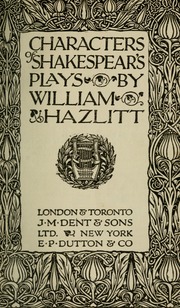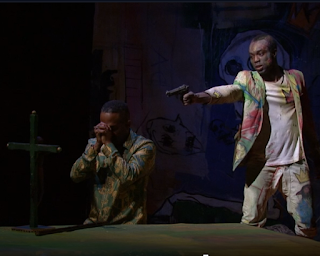Changing Interpretations Over Time: Hazlitt
Fair 'catapulting' forward to the nineteenth century now as we meet William Hazlitt (1778-1830), probably best known for his essays, and hobnobbing with the Romantic poets like Wordsworth, Coleridge, Keats and Shelley - and not his spelling of 'Shakespeare'. He is also considered to be the first great English theatre critic.
The extract below comes from Characters of Shakespear's Plays, published in 1817.
Hamlet is a name; his speeches and sayings but the idle coinage of the poet's brain. What then, are they not real? They are as real as our own thoughts. Their reality is in the reader's mind. It is we who are Hamlet. This play has a prophetic truth, which is above that of history. Whoever has become thoughtful and melancholy through his own mishaps or those of others; whoever has borne about with him the clouded brow of reflection, and thought himself 'too much i' th' sun'; whoever has seen the golden lamp of day dimmed by envious mists rising in his own breast, and could find in the world before him only a dull blank with nothing left remarkable in it; whoever has known 'the pangs of despised love, the insolence of office, or the spurns which patient merit of the unworthy takes'; he who has felt his mind sink within him, and sadness cling to his heart like a malady, who has had his hopes blighted and his youth staggered by the apparitions of strange things; who cannot be well at ease, while he sees evil hovering near him like a spectre; whose powers of action have been eaten up by thought, he to whom the universe seems infinite, and himself nothing; whose bitterness of soul makes him careless of consequences, and who goes to a play as his best resource to shove off, to a second remove, the evils of life by a mock representation of them - this is the true Hamlet....
He is the prince of philosophical speculators; and because he cannot have his revenge perfect, according to the most refined idea his wish can form, he declines it altogether. So he scruples to trust the suggestions of the ghost, contrives the scene of the play to have surer proof of his uncle's guilt, and then rests satisfied with this confirmation of his suspicions, and the success of his experiment, instead of acting upon it. Yet he is sensible of his own weakness, taxes himself with it, and tries to reason himself out of it....
Still he does nothing; and this very speculation on his own infirmity only affords him another occasion for indulging it. It is not from any want of attachment to his father or of abhorrence of his murder that Hamlet is thus dilatory, but it is more to his taste to indulge his imagination in reflecting upon the enormity of the crime and refining on his schemes of vengeance, than to put them into immediate practice. His ruling passion is to think, not to act: and any vague pretext that flatters this propensity instantly diverts him from his previous purposes.
What are the key ideas in Hazlitt's argument? Summarise them in your own words.
Might any still have resonance today? Why/not?
How does this compare with some of the perspectives that we have read previously?
Is there a memorable, standout phrase here?
The extract below comes from Characters of Shakespear's Plays, published in 1817.
Hamlet is a name; his speeches and sayings but the idle coinage of the poet's brain. What then, are they not real? They are as real as our own thoughts. Their reality is in the reader's mind. It is we who are Hamlet. This play has a prophetic truth, which is above that of history. Whoever has become thoughtful and melancholy through his own mishaps or those of others; whoever has borne about with him the clouded brow of reflection, and thought himself 'too much i' th' sun'; whoever has seen the golden lamp of day dimmed by envious mists rising in his own breast, and could find in the world before him only a dull blank with nothing left remarkable in it; whoever has known 'the pangs of despised love, the insolence of office, or the spurns which patient merit of the unworthy takes'; he who has felt his mind sink within him, and sadness cling to his heart like a malady, who has had his hopes blighted and his youth staggered by the apparitions of strange things; who cannot be well at ease, while he sees evil hovering near him like a spectre; whose powers of action have been eaten up by thought, he to whom the universe seems infinite, and himself nothing; whose bitterness of soul makes him careless of consequences, and who goes to a play as his best resource to shove off, to a second remove, the evils of life by a mock representation of them - this is the true Hamlet....
He is the prince of philosophical speculators; and because he cannot have his revenge perfect, according to the most refined idea his wish can form, he declines it altogether. So he scruples to trust the suggestions of the ghost, contrives the scene of the play to have surer proof of his uncle's guilt, and then rests satisfied with this confirmation of his suspicions, and the success of his experiment, instead of acting upon it. Yet he is sensible of his own weakness, taxes himself with it, and tries to reason himself out of it....
Still he does nothing; and this very speculation on his own infirmity only affords him another occasion for indulging it. It is not from any want of attachment to his father or of abhorrence of his murder that Hamlet is thus dilatory, but it is more to his taste to indulge his imagination in reflecting upon the enormity of the crime and refining on his schemes of vengeance, than to put them into immediate practice. His ruling passion is to think, not to act: and any vague pretext that flatters this propensity instantly diverts him from his previous purposes.
What are the key ideas in Hazlitt's argument? Summarise them in your own words.
Might any still have resonance today? Why/not?
How does this compare with some of the perspectives that we have read previously?
Is there a memorable, standout phrase here?




Comments
Post a Comment